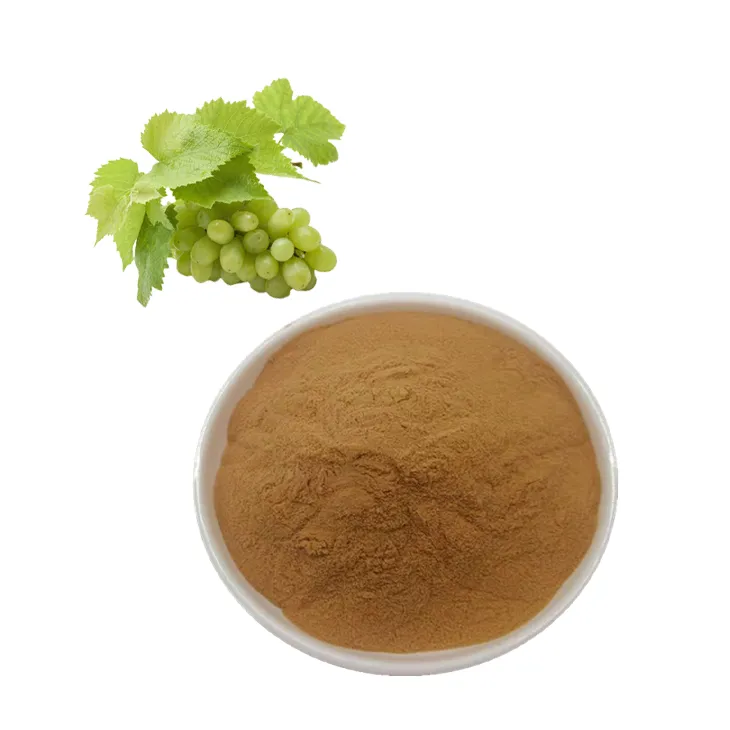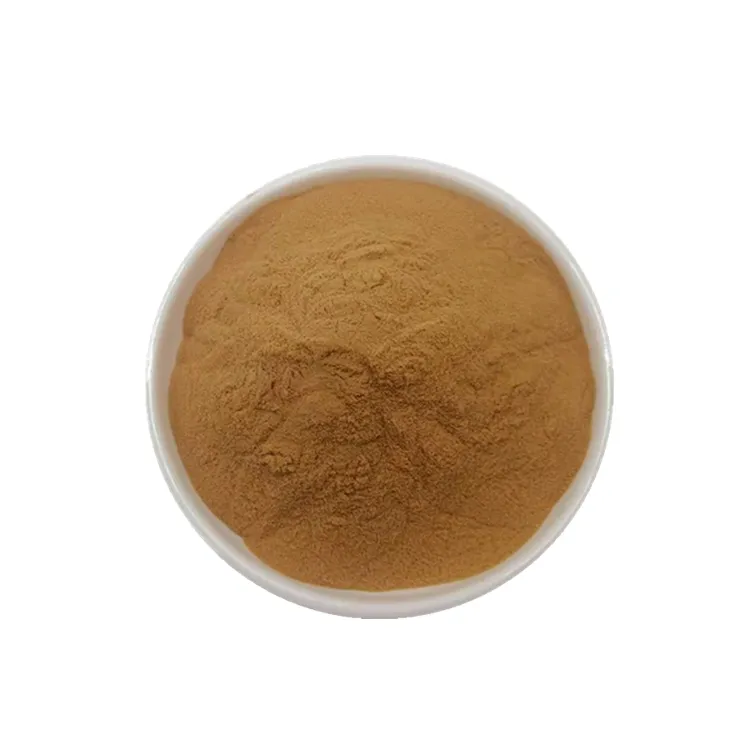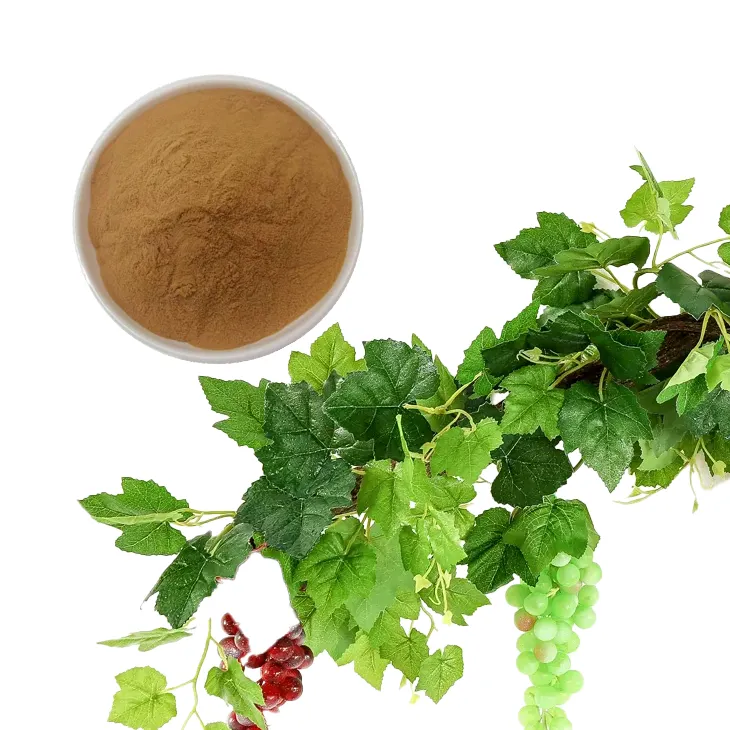- 0086-571-85302990
- sales@greenskybio.com
Grape Leaf Extract: Benefits, Uses and Possible Side Effects
2024-11-13

Introduction
Grape Leaf Extract has emerged as a subject of significant interest in recent years. Derived from the leaves of the grapevine, this extract contains a rich array of bioactive compounds that are believed to offer a variety of health benefits. As research continues to unfold, it is becoming increasingly clear that Grape Leaf Extract has the potential to play a valuable role in promoting well - being, but it also comes with some considerations regarding its use and potential side effects.

Benefits of Grape Leaf Extract
1. Heart Health
Cholesterol Reduction: One of the most notable benefits of grape leaf extract is its potential role in promoting heart health through cholesterol management. Studies have suggested that certain compounds in the extract may help to lower LDL (low - density lipoprotein) cholesterol, often referred to as "bad" cholesterol. By reducing LDL levels, the risk of atherosclerosis, a condition characterized by the hardening and narrowing of the arteries, can be decreased.
Improved Blood Circulation: Grape leaf extract also appears to have a positive impact on blood circulation. It may help to relax and dilate blood vessels, allowing for smoother blood flow. This improved circulation can not only benefit the heart but also has implications for overall health, as it can enhance the delivery of oxygen and nutrients to various tissues and organs throughout the body.
2. Anti - Inflammatory Properties
The extract contains anti - inflammatory compounds that can help to combat chronic inflammation in the body. Chronic inflammation is associated with a wide range of diseases, including heart disease, diabetes, and certain types of cancer. By reducing inflammation, grape leaf extract may play a role in preventing or managing these conditions. For example, it may help to soothe joint inflammation in conditions like arthritis, potentially reducing pain and improving joint function.
3. Antioxidant Activity
Grape leaf extract is rich in antioxidants, such as flavonoids and phenolic acids. These antioxidants help to neutralize free radicals, which are unstable molecules that can cause damage to cells and DNA. By scavenging free radicals, the extract can protect cells from oxidative stress, which is implicated in the aging process and the development of various diseases. This antioxidant activity may also contribute to the maintenance of healthy skin, as it can help to prevent skin damage caused by environmental factors such as UV radiation.
4. Digestive Health
In traditional medicine, grape leaf extract has been used to support digestive health. It may help to regulate digestion by promoting the secretion of digestive enzymes and improving gut motility. Additionally, it has been suggested that the extract may have a soothing effect on the digestive tract, potentially relieving symptoms such as indigestion, bloating, and stomach cramps.

Uses of Grape Leaf Extract
1. Dietary Supplements
Grape leaf extract is commonly available in the form of dietary supplements. These supplements are often marketed as a natural way to support overall health and well - being. They can be taken in capsule or tablet form, and are typically recommended for individuals who may not be getting enough of the beneficial compounds from their diet alone. For example, people with a high - risk of heart disease may consider taking grape leaf extract supplements as part of a comprehensive approach to managing their health.
2. Traditional Medicine
In traditional medicine systems around the world, grape leaves have been used for centuries. For instance, in some Mediterranean cultures, grape leaf extract has been used to treat a variety of ailments, including digestive disorders, skin conditions, and respiratory problems. The leaves are often prepared as infusions or decoctions and consumed orally or applied topically depending on the intended use.
3. Cosmetics
Due to its antioxidant and anti - inflammatory properties, grape leaf extract is also finding its way into the cosmetics industry. It can be included in skincare products such as creams, lotions, and serums. These products claim to improve skin health by reducing inflammation, protecting against free - radical damage, and promoting collagen production. Collagen is a protein that is essential for maintaining the elasticity and firmness of the skin.

Possible Side Effects of Grape Leaf Extract
1. Allergic Reactions
Some individuals may be allergic to grape leaf extract. Allergic reactions can range from mild symptoms such as skin rashes, itching, and hives to more severe symptoms like difficulty breathing and swelling of the face, lips, or tongue. People with known allergies to grapes or other related plants should be cautious when using grape leaf extract products.
2. Gastrointestinal Disturbances
Although grape leaf extract is often used to support digestive health, in some cases it may cause gastrointestinal disturbances. This can include symptoms such as nausea, vomiting, diarrhea, or abdominal pain. These side effects are more likely to occur when the extract is consumed in large amounts or when an individual has a sensitive digestive system.
3. Interaction with Medications
Grape leaf extract may interact with certain medications. For example, it may affect the way medications are metabolized in the body, potentially increasing or decreasing their effectiveness. People who are taking medications, especially those for heart disease, diabetes, or blood - thinning medications, should consult their healthcare provider before using grape leaf extract supplements.
Conclusion
Grape leaf extract offers a wide range of potential benefits, from promoting heart health to providing antioxidant protection and supporting digestive health. It has diverse uses in dietary supplements, traditional medicine, and cosmetics. However, it is important to be aware of the possible side effects, such as allergic reactions, gastrointestinal disturbances, and potential interactions with medications. As with any natural product, it is advisable to consult a healthcare professional before starting to use grape leaf extract, especially if you have pre - existing health conditions or are taking medications.
FAQ:
What are the main benefits of grape leaf extract for heart health?
Grape leaf extract may promote heart health mainly through potentially reducing cholesterol levels and improving blood circulation. Cholesterol reduction can help prevent the build - up of plaques in the arteries, which is associated with heart diseases. The improvement in blood circulation ensures that the heart gets an adequate supply of oxygen and nutrients, thus enhancing its overall function.
How is grape leaf extract used in dietary supplements?
Grape leaf extract is often used in dietary supplements in various forms. It can be encapsulated as a supplement that people can take orally, usually following the recommended dosage instructions. Some dietary supplements may combine grape leaf extract with other beneficial ingredients to enhance its overall effect on health, such as antioxidants or vitamins. It is important to note that these supplements should be used under proper medical or nutritional guidance.
What are the traditional medicine uses of grape leaf extract?
In traditional medicine, grape leaf extract has been used for a variety of purposes. It has been used to treat certain digestive disorders, for example, to relieve symptoms of indigestion or diarrhea. It may also have been used topically to treat skin conditions in some traditional practices. However, it should be noted that while these traditional uses exist, more scientific research is often needed to fully understand and validate these applications.
What are the possible side effects of grape leaf extract?
Some possible side effects of grape leaf extract may include mild gastrointestinal discomfort, such as nausea, stomach cramps, or diarrhea, especially when taken in excessive amounts. In some rare cases, allergic reactions may occur in individuals who are hypersensitive to grape - related products. Pregnant or breastfeeding women should be especially cautious when considering using grape leaf extract as its safety in these situations has not been fully established.
Is there any evidence to support the cholesterol - lowering effect of grape leaf extract?
There have been some studies that suggest a potential cholesterol - lowering effect of grape leaf extract. However, more research is needed to establish conclusive evidence. Some early research findings indicate that certain compounds in the grape leaf extract may interfere with the body's cholesterol metabolism, but the exact mechanisms are still being explored. It is important to wait for more comprehensive and large - scale studies to fully confirm this benefit.
Related literature
- The Health Benefits of Grape Leaf Extract: A Review"
- "Grape Leaf Extract in Traditional and Modern Medicine"
- "Potential Side Effects of Dietary Supplements Containing Grape Leaf Extract"
- ▶ Hesperidin
- ▶ Citrus Bioflavonoids
- ▶ Plant Extract
- ▶ lycopene
- ▶ Diosmin
- ▶ Grape seed extract
- ▶ Sea buckthorn Juice Powder
- ▶ Fruit Juice Powder
- ▶ Hops Extract
- ▶ Artichoke Extract
- ▶ Mushroom extract
- ▶ Astaxanthin
- ▶ Green Tea Extract
- ▶ Curcumin
- ▶ Horse Chestnut Extract
- ▶ Other Product
- ▶ Boswellia Serrata Extract
- ▶ Resveratrol
- ▶ Marigold Extract
- ▶ Grape Leaf Extract
- ▶ New Product
- ▶ Aminolevulinic acid
- ▶ Cranberry Extract
- ▶ Red Yeast Rice
- ▶ Red Wine Extract
-
White Willow Bark Extract
2024-11-13
-
Senna Leaf Extract
2024-11-13
-
Coconut Water Powder
2024-11-13
-
Wheat Germ Extract
2024-11-13
-
Alisma Extract
2024-11-13
-
Pine bark Extract Powder
2024-11-13
-
Medicinal Marshmallow Extract
2024-11-13
-
Mulberry Extract
2024-11-13
-
Phellodendron Extract
2024-11-13
-
Troxerutin
2024-11-13





















